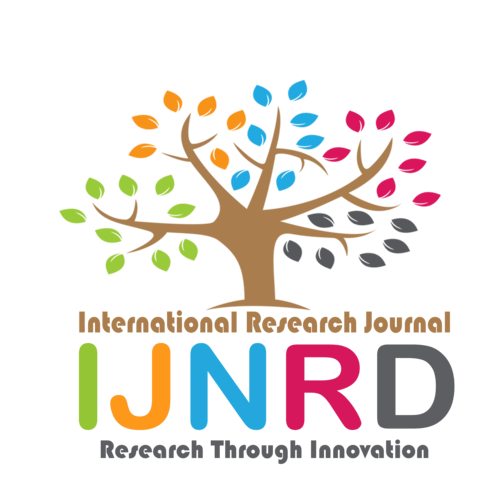|
|||||||||||||||

|
INTERNATIONAL JOURNAL OF NOVEL RESEARCH AND DEVELOPMENT International Peer Reviewed & Refereed Journals, Open Access Journal ISSN Approved Journal No: 2456-4184 | Impact factor: 8.76 | ESTD Year: 2016 Scholarly open access journals, Peer-reviewed, and Refereed Journals, Impact factor 8.76 (Calculate by google scholar and Semantic Scholar | AI-Powered Research Tool) , Multidisciplinary, Monthly, Indexing in all major database & Metadata, Citation Generator, Digital Object Identifier(DOI) |
||||||||||||||
Issue: May 2024
Volume 9 | Issue 5
Review Result and Publication of Paper within : 2-3 days
Click Here For more DetailsFor Authors
Forms / Download
Published Issue Details
Editorial Board
Other IMP Links
Facts & Figure
Impact Factor : 8.76
Issue per Year : 12
Volume Published : 9
Issue Published : 96
Article Submitted :
Article Published :
Total Authors :
Total Reviewer :
Total Countries :
Indexing Partner
Join RMS/Earn 300
Licence
This work is licensed under a Creative Commons Attribution-NonCommercial 4.0 International License







|
Published Paper Details
|
|
| Paper Title: | EMPOWERING HERBAL KNOWLEDGE: A DEEP LEARNING APPROACH FOR ACCURATE AND EFFICIENT IDENTIFICATION OF MEDICINAL PLANTS |
| Authors Name: | Ms. S. AGNES JOSHY S , Mr. ANBU SIRANJEEVI.S S |
| Download E-Certificate: | Download |
| Author Reg. ID: |
IJNRD_217943
|
| Published Paper Id: | IJNRD2404298 |
| Published In: | Volume 9 Issue 4, April-2024 |
| DOI: | |
| Abstract: | Traditional Indian Ayurvedic medicine. The raw materials from which Ayurvedic medicines are made in nature are mostly herbs and minerals. India also has many homemade herbal remedies for common ailments. This knowledge was passed down from generation to generation in large joint families. This knowledge is slowly fading away from the current generation of nuclear families. The current generation cannot identify even locally available plants. To date, the total number of plant species on Earth has been identified as almost four hundred thousand. With so many plant species, an intelligent system is needed to identify the plant species. The leaf is one of the most important and visible parts of the plant and is available throughout the year. Leaves are important in plant identification. Plant Leaf Classification (PLC) is the process of automatically identifying plant species based on an image of a plant leaf. This field of research was found to be emerging and has connections with computer science and plant science. Many researchers have worked in this area of PLC using image processing, feature extraction and machine learning techniques. This thesis mainly focuses on the classification of leaf images of Ayurvedic plants available in and around Visakhapatnam. Visakhapatnam is a popular city in the Indian state of Andhra Pradesh. The main purpose of this thesis is to identify some leaves that are important in Ayurveda (a very old traditional medicine). Only the leaf tag can be extended to any leaf of the plant. Convolutional Neural Networks (CNN) were used to solve the Ayurvedic Plant Leaf Classification (APLC) problem of this thesis. APLC is designed to identify seven locally available Ayurvedic plants/trees. The seven Ayurvedic plants/trees are Hibiscus Rosa Sinensis (Mandara), Tabernaemontana Divaricata (Nadhivardanam), Ocimum Tenuiflorum (Tulasi), Ficus Religiosa (Raavi or Peepul), Syzygium Cumini (Neredu) Eucalyptus and Catharanthus Roseu (B). Since seven different Ayurvedic plants/trees can be classified based on leaf images, it is a multi-class classification problem. A CNN architecture consisting of an input layer, three convolutional layers, three max-connection layers, one smoothing layer, one dense layer, one rectified linear unit (ReLU) activation layer, one output layer, dense vi output layer and Softmax activation. layer was built This CNN architecture called "AYURNet". The name "AYURNet" is created by extracting the first four letters "AYUR" from Ayurveda and the last three letters "Network" from Convolutional Neural Networks. This CNN architecture had to be trained based on images from the respective Ayurvedic journals. Images of Ayurvedic plant leaves were not readily available. Therefore, the collection and creation of magazine photo material had to be carried out as part of this thesis. Creating an image database for an Ayurvedic journal was a labor-intensive and time-consuming task. Due to the hot and humid environment of Visakhapatnam, the problem was that the leaves wilted quickly when picked. That is why the leaves had to be photographed from the outside, so that they would not wither and fall off. It is well known that CNN needs a large training image dataset to build a predictive CNN model with high accuracy. Since the amount of plant leaf data needed to build a CNN model did not provide guidance for highly accurate classification of Ayurvedic plant leaves, experiments were conducted as part of this thesis to determine the optimal dataset. Specified size. The Keras deep learning framework was used as the Tensor Flow backend to build the CNN model. The freely available Google Colab platform was used to train this model. The images of the magazine were saved in a specific folder in Google Drive. Graphics processing unit (GPU) hardware acceleration was used to train the CNN model. In addition to the GPU, the Google Colab platform has a more powerful and advanced hardware called the Tensor Processing Unit (TPU). You can train much faster with TPU. There is a problem with TPU training. The current Tensor Flow documented method for training with TPU requires storing image data in TF Record format to Google's cloud storage devices. Google's cloud storage packages are proprietary and charge a dollar for delivery. This thesis addressed this topic. A method and program have been developed to download data from shared storage such as Google Drive to TPU. TPU hardware acceleration was then used to train the CNN model. The results obtained in several stages of the experimental process were found to be satisfactory, and the proposed method can be extended or used for the classification of each plant leaf. |
| Keywords: | Plants |
| Cite Article: | "EMPOWERING HERBAL KNOWLEDGE: A DEEP LEARNING APPROACH FOR ACCURATE AND EFFICIENT IDENTIFICATION OF MEDICINAL PLANTS", International Journal of Novel Research and Development (www.ijnrd.org), ISSN:2456-4184, Vol.9, Issue 4, page no.c559-c568, April-2024, Available :http://www.ijnrd.org/papers/IJNRD2404298.pdf |
| Downloads: | 00050 |
| ISSN: |
2456-4184 | IMPACT FACTOR: 8.76 Calculated By Google Scholar| ESTD YEAR: 2016 An International Scholarly Open Access Journal, Peer-Reviewed, Refereed Journal Impact Factor 8.76 Calculate by Google Scholar and Semantic Scholar | AI-Powered Research Tool, Multidisciplinary, Monthly, Multilanguage Journal Indexing in All Major Database & Metadata, Citation Generator |
| Publication Details: |
Published Paper ID:IJNRD2404298 Registration ID: 217943 Published In: Volume 9 Issue 4, April-2024 DOI (Digital Object Identifier): Page No: c559-c568 Country: Kadambur/ Thoothukudi , Tamilnadu , India Research Area: Medical Science Publisher : IJ Publication Published Paper URL : https://www.ijnrd.org/viewpaperforall?paper=IJNRD2404298 Published Paper PDF: https://www.ijnrd.org/papers/IJNRD2404298 |
| Share Article: | |
|
Click Here to Download This Article |
|
| Article Preview | |
|
|
|
Major Indexing from www.ijnrd.org
| Semantic Scholar | Microsaoft Academic | ORCID | Zenodo |
| Google Scholar | ResearcherID Thomson Reuters | Mendeley : reference manager | Academia.edu |
| arXiv.org : cornell university library | Research Gate | CiteSeerX | PUBLON |
| DRJI | SSRN | Scribd | DocStoc |
ISSN Details
 |
 |
ISSN: 2456-4184
Impact Factor: 8.76 and ISSN APPROVED
Journal Starting Year (ESTD) : 2016
DOI (A digital object identifier)
Conference
Open Access License Policy
Important Details
Social Media
| Copyright © 2024 - All Rights Reserved - IJNRD |












Facebook Twitter Instagram LinkedIn